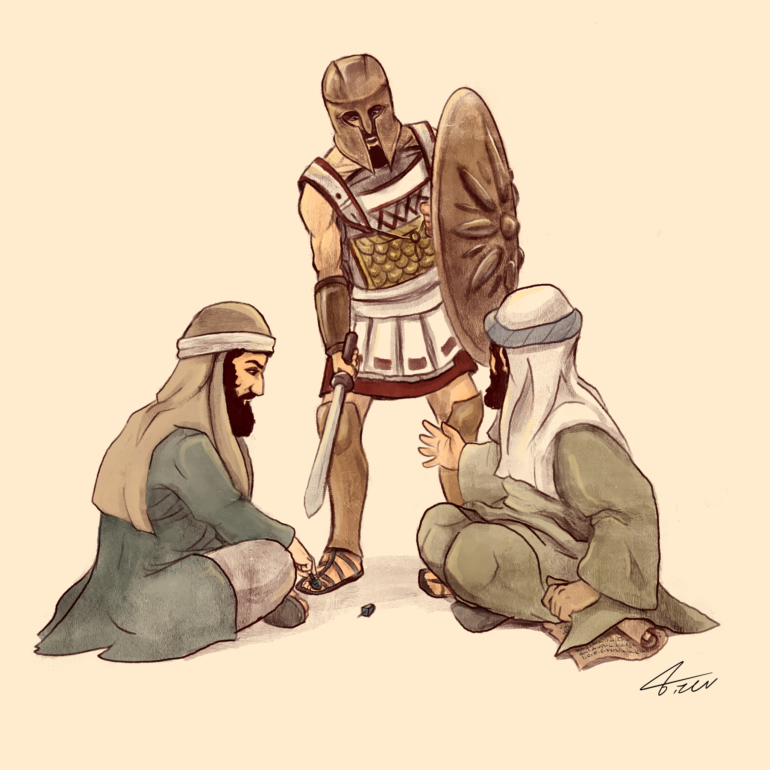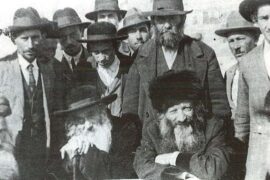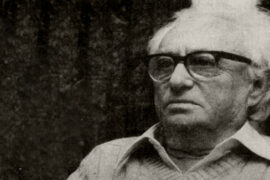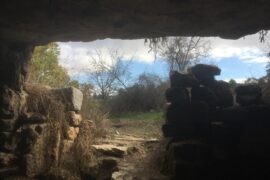The fourth chapter of a podcast series on the first Book of Maccabees.
For more content from VISION Magazine, subscribe to our newsletter and follow us on Twitter @VISION_Mag_, Facebook and YouTube. If you haven’t already, don’t forget to subscribe to our podcast on SoundCloud, iTunes, Stitcher, TuneIn, or Spotify and leave a rating and review to help us get our message out to a wider audience!
To support the podcast, head over to our PayPal portal and be sure to write a note that your contribution is for the podcast.
Hosted by: Robert Goodman
Transcript:
Shalom Aleikhem! And welcome back to Sefer Maccabim!
We learned last time about some of Yehuda HaMaccabi’s first great victories, including against Apollonius in the Gofna hills and against Seron at Bet-Ḥoron. Now a gigantic army more than forty thousand strong are encamped on the borders of Judea intending to destroy everyone within it, and Yehuda has gathered the Jews at Mitzpa to entreat the Kadosh Baruch Hu and prepare for the impending battle.
Gorgias, one of the three army generals, seeing how previous attempts to confront the Jews have failed miserably, decides to launch a sneak attack. He takes five thousand foot soldiers and a thousand cavalry, and leads them out of the camp while it’s still night, in order that he should be able to attack the Maccabees suddenly and swiftly and wipe them out. How does he find his way through the mountains? Hellenist Jews agree to guide him. News of this surprise attack, however, reaches Yehuda, who thinks to himself, perfect! If Gorgias has taken these men to hunt us, they’re no longer protecting the Greek camp! Now’s the perfect opportunity to attack the Greek camp and beat Gorgias at his own game.
So Yehuda takes 3000 of his most valiant men, and under cover of night they sneak out of the mountains and descend to the Greek camp at Emmaus, on the plain, and as day breaks they blow their shofars and fall upon the Greek camp, and despite having neither armour nor swords smite the mercenaries easily. Yehuda, however, keeps his men from taking the spoils, telling them that once they have finished off Gorgias’s men there’ll be plenty of time for spoils. Meanwhile Gorgias and his army have reached the Maccabean camp, and lo and behold! – there’s no one there. Gorgias assumes the Jews must have retreated further into the mountains, and sets off in pursuit of them. As dawn approaches it seems he gives up and returns back toward Emmaus, but when he and his army approach their camp they are shocked to find it in flames and the Jews arrayed on the plain, with Yehuda at their head, ready for battle.
The Seleucids are stricken with panic, and flee to the lands of the Philistines by the coast, and only then do the Jews take the spoils of war left behind, including gold, silver, and the blue and purple cloths known as תכלת and ארגמן – the same royal fabrics that were used to build the Mishkan over a thousand years before. This whole confrontation became known as the Battle of Emmaus, and the text describes it as a great salvation for Israel.
Shaken, the surviving mercenaries return to Antioch and inform Lysias of their terrible defeat. Lysias, as might be expected, is terribly confused and disheartened that he has not been able to fulfill the king’s desire – and what will Antiochus do to him now?
Lysias knows he must attack again, but it takes him a year until he finally sends the army. Maybe he wanted a break, maybe he needed the time to reorganize the army. In any case, it’s important to realize that the Maccabean revolt was not simply twenty-six years of non-stop battles, but rather on-and-off fighting that consisted of major battles interspersed between prolonged periods of rest.
In any case, the following year Lysias gathers an even bigger army, 60,000 foot soldiers and five thousand cavalry, and leads them into Judea that they might put an end to this ridiculous Jewish rebellion once and for all. The army encamps at Beit-Tzur in the mountains south-west of Yerushalayim, near Ḥebron, and Yehuda goes out to meet them with ten thousand men (truly the few against the many).
When Yehuda sees the mighty Seleucid army, he looks upward and proclaims a t’filla to HaShem:
“Blessed are you HaShem, God and redeemer of Israel, you smote the sons of the giants through the hand of David your servant, and you gave over the army of heathens into the hands of Yonatan son of Shaul and his armor bearer. Now also give this camp into the hand of your people Israel, in order to shame them and destroy them in their great strength and wealth.”
Yehuda goes on to request that the mercenaries be stripped of their courage and fall by the sword of those who love you, so that all who know your name will sing your praises. With that, the ten thousand Jews engage the sixty thousand plus Seleucids, and using their mountain tactics of leading the enemy soldiers into the valleys and raining arrows and stones on them, they successfully slay around five thousand mercenaries. This battle, taking place three years after the initial uprising in Modiin, becomes known as the battle of Beit-Tzur, another miraculous victory for the Maccabees.
By this point Lysias has realized one thing about the Jews that makes them so hard to overcome in battle: they are not afraid to die for their cause. As Rabbi Spiro points out in his book, this was completely unique in the ancient polytheistic world because no one else was willing to die for their faith; the prevailing attitude between different peoples worshipping different gods was, “I’ll worship your god and you worship mine. The more gods the merrier.”
Only we, the Jews, with our message of ethical monotheism to spread to the world, were willing to die for our Torah.) In any case, Lysias realizes that he needs time to regroup, so he withdraws his troops north to Antioch, a major Seleucid city on the Mediterranean coast, to prepare an even mightier army to invade Judea again.
Yehuda watches them go, and he knows they can’t possibly be gone forever. But he also knows it’s going to be a long time, months even, before they’re ready to attack again, and in the meantime, his people have respite. So he turns to his people and addresses them: “This is the chance we’ve been waiting for. While the Greeks retreat to Antioch to nurse their wounds, we shall ascend to Yerushalayim, and repair and purify the Beit HaMikdash, which has been waiting for us all this time.” The God-fearing Jews have not been able to visit Yerushalayim since the reign of terror was set in motion by Antiochus; now that Lysias has withdrawn the Seleucid troops the only pocket of resistance left in the country is the Acra, where Greeks and Hellenist Jews have barricaded themselves, and there is no way they will dare to oppose the Maccabi army marching into Yerushalayim en masse. So B’nei Yisrael return to Yerushalayim in great joy, but the further they march into the city, the more subdued they become, their joy slowly being replaced by horror. And as they reach the courtyard of the Beit HaMikdash, a monstrous sight meets their eyes.
The Beit HaMikdash has been turned into a pagan sanctuary. The mizbe’aḥ is defiled and pigs have been sacrificed on it, with infested pigs’ flesh rotting everywhere. The carved wooden gates at the entrance to the courtyard are burned. Plants are growing in the courtyard as in a forest, the blue embroidered parokhet separating the Kodesh and Kodesh HaKodoshim is torn down, and the site has been made utterly desolate. The Jews tear their clothes and place ashes on their heads, fall down on their faces and cry out bitterly, mourning that this holiest of places could be reduced to such a desolate state as this.
But it’s not a time for mourning. Before beginning any repair work Yehuda sends some men to guard the Acra to make sure the Greeks and Hellenist Jews cooped up there don’t try and fight back. With that taken care of, the first thing the Maccabees do is to try and light the menora – but what will they use? After all, didn’t we learn back in chapter 1 how when Antiochus returned from Egypt he ransacked the Beit HaMikdash and carried off all the vessels contained therein? A makeshift menorah is fashioned out of wood, but what can they light it with? Only pure olive oil with the seal of the Kohen Gadol can be used to light it, and while the Greeks were in control they defiled every container of oil in the place! After much searching they eventually discover one jar of oil with an unbroken seal, but it’s only enough oil to burn for one day. The Maccabees decide to use it anyway to light the menorah, and as we all know, a miracle occurs and it stays lit for eight days, when enough time has passed for a delegation of Jews to press new oil and deliver it to the Beit HaMikdash.
We’ll speak more about the miracle of the oil later, but for now it’s interesting to note that the Book of Maccabees doesn’t actually mention the miracle of the oil. Luckily for us, we know what happens from the G’mara in Masekhet Shabbat 21b:
“When the Greeks entered the Sanctuary they defiled all the oils that were in the Sanctuary by touching them. And when the Hasmonean monarchy overcame them and emerged victorious over them, they searched and found only one cruse of oil that was placed with the seal of the High Priest, undisturbed by the Greeks. And there was sufficient oil there to light the menorah for only one day. A miracle occurred and they lit from it eight days.”
After this, the Jews set about making the Beit HaMikdash back into the Beit HaMikdash. Yehuda chooses God-fearing kohanim to remove the impure stones from the courtyard, and eventually they decide to pull down the mizbe’aḥ because pigs were sacrificed on it, and they bring in whole stones and build a new one. They clean the courtyard and repair the damaged buildings and fortifications.
They also craft new vessels for the Beit HaMikdash to replace the ones taken by Antiochus, including a new shulḥan, a new golden mizbe’aḥ for the ketoret, and a new menorah, made of gold this time. Where do they find the gold and silver when Antiochus ransacked the treasury? I’m sure that the Jews around Judea were eager to contribute any valuables they might’ve owned, but you’ve got to remember that in the wake of the Battle of Emmaus the Maccabees collected truckloads of spoils from the Greeks in the form of precious metals and fabrics. I’m sure these were used as well. And if it seems strange that Greek spoils should be used to rededicate the Jewish house of worship, remember that all the gold B’nei Yisrael took out of Egypt was once owned by the Egyptians, and some of this gold was used to build the Mishkan in the desert. Some of it, on the other hand, was used to build the golden calf. This is something else I learned from Rabbi Yehuda. And on a deeper level, gold represents wisdom and cultural wealth. When we take gold out of Egypt, i.e. absorb wisdom and cultural values from other civilizations foreign to our own, we have to know how to sift them. Which are suitable for us to integrate into our own society and can allow us to better fulfill our national mission, and which are actually harmful and require discarding? Living in the generation of the geula, it’s vital we learn how to sift this foreign gold.
Returning to the text, the Jews repair the paroches and hang it up again inside the Beit HaMikdash, and bring the keilim inside. They bake twelve loaves of leḥem hapanim to place on the shulḥan, light the golden menorah with their fresh supply of olive oil, and burn ketoret on the inner mizbe’aḥ. Finally, on the twenty fifth of Kislev in the year 3625, three years after the start of the revolt, the Beit HaMikdash is fully purified, and the Maccabees gather the Jews there to rededicate the Beit HaMikdash in an official ceremony.
Now we have to ask ourselves, why this date? Looking back to chapter 1, we see that the Greeks also chose the same date to defile the mizbe’aḥ by sacrificing pigs over it. This can’t be a coincidence; there must be something significant about this date. The Maharal of Prague, in נר מצוה, gives a wonderful answer I’ll share now.
Looking back to the six days of creation, if Adam HaRishon was created on Rosh HaShana, the first of Tishrei, by counting back five days we can work out that the first day, when light was created, fell on the twenty fifth of Elul. Maharal goes on to discuss how when the light was created, it was perfectly balanced with the dark, but as the level of light changes throughout the year it has four ‘boundaries’: when the light has reached its peak, which occurs on the twenty fifth of Sivan, when light and dark are perfectly balanced, which happens twice on the twenty fifth days of Elul and Adar, and when the darkness has reached its peak, which occurs on the twenty fifth of Kislev. Thus we see how although as fall progresses into winter the level of light decreases, by the twenty fifth of Kislev the light has reached its minimum level as begins to grow again. This date, even from before creation, was given a special power of rebirth, or rededication.
Starting on this date, for eight consecutive days, the Jews rededicate the Beit HaMikdash by rising early in the morning and bringing korbanot on the new mizbe’aḥ amid joyous singing and playing of musical instruments by the Levi’im. The people fall on their faces in gratitude and praise HaShem for driving out the goyim and bringing them this salvation. For the ceremony they go to extra lengths to decorate the Beit HaMikdash with crowns of gold and shields.
One of the last verses in the chapter reads:
And Yehuda, his brothers and the entire congregation commanded that the dedication of the mizbe’aḥ on the twenty fifth of the month of Kislev should be celebrated every year with praise and thanksgiving to HaShem.
Thus the holiday we know as Ḥanukah is established as part of our calendar, and to commemorate the victory at Beit-Tzur, the liberation of Yerushalayim and the rededication of the Beit HaMikdash, Jews the world over will light menorahs, eat oily foods and celebrate these eight days beginning on the twenty fifth of Kislev as days of celebration for thousands of years to come. You and I are living proof of that.
The last thing mentioned in this chapter is how the Jews take advantage of the Seleucid absence to fortify the walls around Mount Zion, the portion of Yerushalayim containing the Beit HaMikdash, to prevent the Greeks from returning and taking control of it as before. Finally, they fortify the city of Beit-Tzur, the place of the last battle, to provide a defense against invading Seleucids or Idumeans from the south.
This concludes chapter 4, but I want to speak for a little about the miracle of the oil. There are many interpretations for the miracle of the one-day oil supply lasting eight days, but for my part, I want to give an interpretation I read concerning the miracle which, unless you listened to this shiur last year, you may not have heard before.
When Matityahu and his followers declared war on Seleucid Greece, not everyone agreed with them. And I’m not even talking about the Hellenists; even among the God-fearing Jews there were disagreements as to whether or not to support the militant Maccabi faction. Even in the first years of battle when we achieved great victories as we’ve already learned, not everyone agreed our war was miraculous in nature, or whether HaShem wanted us to be fighting the Greeks. But then when we liberated Yerushalayim and lit the menorah, we experienced an open miracle – the oil lasting eight days – which could clearly only have come directly from HaShem. The miracle of the oil was therefore a stamp of Divine approval that HaShem desired us to fight this war and free Eretz Yisrael from foreign rule.
What’s even more amazing is how we see this chain of events playing out again in modern Jewish history. In 1948 when we declared independence, we certainly experienced impressive victories, but they were costly, and they were not openly miraculous. Following the end of the 1948 war, we existed for nearly twenty years in a poor ghetto-state with truncated borders, without Yerushalayim or the heartland of our country, and it was still possible for people to deny that things had changed or that the Holy One had put an end to the exile of our people.
But then in 1967, we experienced one of the most openly miraculous wars in our entire history, only second to the sun standing still for Yehoshua in Givon. In only six days, Israel achieved a stunning victory over impossible odds that not only granted Israel defensible borders and reunited us with the cradle of Jewish civilization but also revealed the entire enterprise of the return to Zion and renewed Jewish sovereignty to be of a miraculous nature.
Like the one day oil supply lasting eight days for the heroic Maccabees, the Six Day War served as a stamp of Divine approval for our entire liberation movement and the restoration of Jewish independence in our land.
We’ll resume next time with chapter 5, when news of the Jewish liberation of Yerushalayim reaches the surrounding nations.





